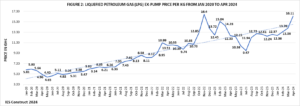By Kizito CUDJOE
A regression analysis conducted by the Institute for Energy Security (IES) has revealed a concerning trend of declining of Liquefied Petroleum Gas (LPG) consumption within the country’s downstream petroleum sector. The study, spanning from January 2020 to December 2023, with an extension into April 2024, highlight several challenges facing both consumers and policymakers.
According to IES, a declining LPG consumption trend, of approximately 4.47 percent, was observed from January 2020 to December 2023.
This stands in stark contrast to the preceding four-year period, which saw a growth of roughly 6.43 percent. Monthly consumption figures fluctuated significantly, with November 2020 marking the peak at 35,298,600 kilograms, while April 2023 recorded the lowest consumption at 21,146,427 kilograms.
The IES analysis establishes that rising prices contributed significantly to the overall 4.47percent decline in consumption from January 2020 to December 2023. The study revealed a considerable increase in the ex-pump price per kilogram of LPG, more than doubling from Gh¢5.81 to Gh¢12.57 between January 2020 and December 2023.
This surge in prices was particularly pronounced in the first four months of 2024, witnessing one of the sharpest increases, of 30 percent, since October 2022, soaring to Gh¢16.11 per kilogram in April.
The study’s Coefficient of Determination (R² = 0.1647) highlighted that approximately 16.47 percent of the variability in LPG consumption can be explained by pricing variations, indicating the presence of other influential factors not captured in the model.

“External factors that explain the variation in LPG consumption data in Ghana includes reduced purchasing power of consumers due to worsened economic condition, Cedi’s depreciation, a ban on new LPG outlets which could impact negatively on accessibility, and introduction of government policies,” the study captured.
A moderate negative correlation of approximately -0.41 was found between LPG price per kilogram and consumption, indicating that as prices rise, consumption tends to decrease. The regression coefficient of approximately -0.35 further solidified this negative relationship, suggesting that a cedi increase in the price of LPG per kilogram could lead to a reduction of about 0.35 million kilograms in consumption.
The analysis by the IES underscored the significance of external factors, such as reduced purchasing power, currency depreciation, and government policies, in influencing LPG consumption patterns.
“Therefore, we can conclude that there is strong evidence to reject the null hypothesis, which states that the independent variable (LPG price per kilogram) has no statistically significant effect on the dependent variable (LPG consumption). Per these findings, analysts and policy-makers can make predictions or draw conclusions about how changes in LPG prices may impact consumption patterns in Ghana,” the study concluded.










